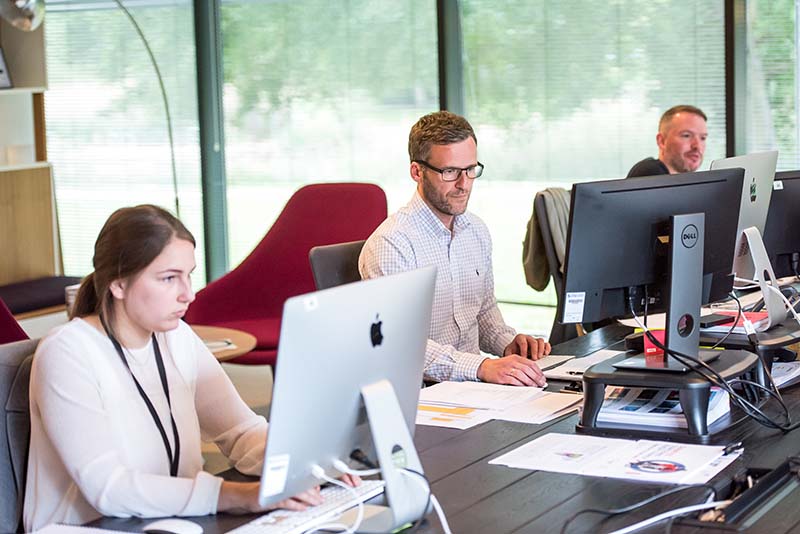How Technology is Transforming the Tax Function

(Arlington Research / unsplash)
You know how you can order takeout from certain restaurants and “see” your order progress virtually as it is received, made and delivered to your door? That same level of transparency is happening in every facet of life and business. Tax and accounting functions are no different.
Whether in public or corporate accounting, technology is transforming everything, including tax operations, data analytics, data management and automation. Specifically, tax-related tasks are simultaneously the catalysts behind AI innovations and the beneficiaries.
Technology is producing information more rapidly, accurately and efficiently than ever before. Plus, the interconnectedness of people and businesses through the internet makes that information more readily available for anyone to track.
As a result of tech and automation, compliance and reporting tasks are more manageable, more efficient and all-encompassing–there’s greater insight into the big picture. But in the future, you can expect compliance and reporting tasks to go to the AI bots. Meanwhile, accounting and tax functions performed by skilled workers will take that all-encompassing big-picture info, run prediction models and create business strategies.
Here’s a breakdown of how the future of tax and accounting is predicted to transform the tax function:
Shifting approaches and methodologies
Face-to-face meetings, paper trails and rows upon rows of filing cabinets that were the norm for accounting and tax departments will become a thing of the past. For many organizations, this already holds true. Virtual meetings have replaced and will continue to take the place of in-person office meetings. Software is replacing traditional paper and filing cabinets, allowing for more extensive data storage.
New technologies are delivering fresh insights for a holistic viewpoint into an organization. Knowledgeable tax professionals and accountants are becoming even more indispensable to their organizations as long as they stay abreast of how to make an intricate tax system work in the business’s favor. Tax is becoming the hub of advancement–moving away from collections and towards innovation.
From tax function to innovation hotbed
Tax professionals are needed as advisors and consultants for all steps of the process, from formulation to onboarding to maintenance. Software developers are needed for guidance on best practices and functionality. Organizations need assistance from their inside accounting or tax professionals or else an outside consultant to ensure that new AI systems are configured correctly. The career possibilities are endless for financial professionals.
Armed with a bigger picture of company or client financials, business leaders can make better choices. Even though the data is fast-paced, there’s more time to consider options and make decisions due to having the latest and greatest financial picture. Up-to-the-minute information coupled with a deep knowledge of subjects such as tax credits, incentives and policies will allow accounting and tax professionals to develop scenarios and business strategies. They can strengthen their organization’s economic value while bolstering their own value within their company.
Sustainability and transparency
Technology broadens knowledge. Deeper knowledge and insight helps with decision-making, and good decisions add life and sustainability to business. Accordingly, organizations willing to adopt and adapt to high tech create more stable environments for themselves and their investors.
History has demonstrated that, for a business to do well, it also has to do good. Investors want to see evidence of a business’s sustainability. They are looking to the financials to see, at the very least, if a business seems honest and reliable. It’s even better if a company gets involved in philanthropic measures such as charitable donations and environmentally friendly efforts.
Open tracking provided by new technologies will affect a business’s reputation and brand perception. Those who can show off their financials with pride will gain trust, loyalty and a more significant piece of the market share pie.
Careers reshaped
Rather than a one-path-fits-all trajectory, accountants and tax professionals will find themselves in specialized and diverse career paths. Never-before-seen niches like blockchain, AI and digital tax services are just the beginnings of what the future holds.
Data and tech jobs within accounting and finance were already trending upwards pre-pandemic. Digital operations post-Covid-19 grew even more. As such, tech specialties will continue to be in high demand.
Ongoing education and a diverse talent or knowledge base are necessary for anyone aspiring to advance their career and remain relevant in today’s accounting job pool.
Find your specialty. Broaden and deepen your knowledge with OSCPA.
Organizational societies and continuing education opportunities, like the ones provided by The Ohio Society of CPAs (OSCPA), provide quality information to deepen and broaden the financial professional’s knowledge. For those still looking for their specialty, it can help to cast a wide net, delving into many different topics. Then, hone in on the few that are particularly interesting, developing a specialty.
Check out The OSCPA’s website to learn more about issues affecting CPAs and financial professionals. Consider signing up for the Mega Tax Conference to learn about tax issues such as technology’s impact. Members get a discounted rate, but all attendees can get hours of quality online tax CPE courses. We proudly serve our members to improve our local economy, and prepare our state’s accountants for the future. Won’t you join our ranks?
